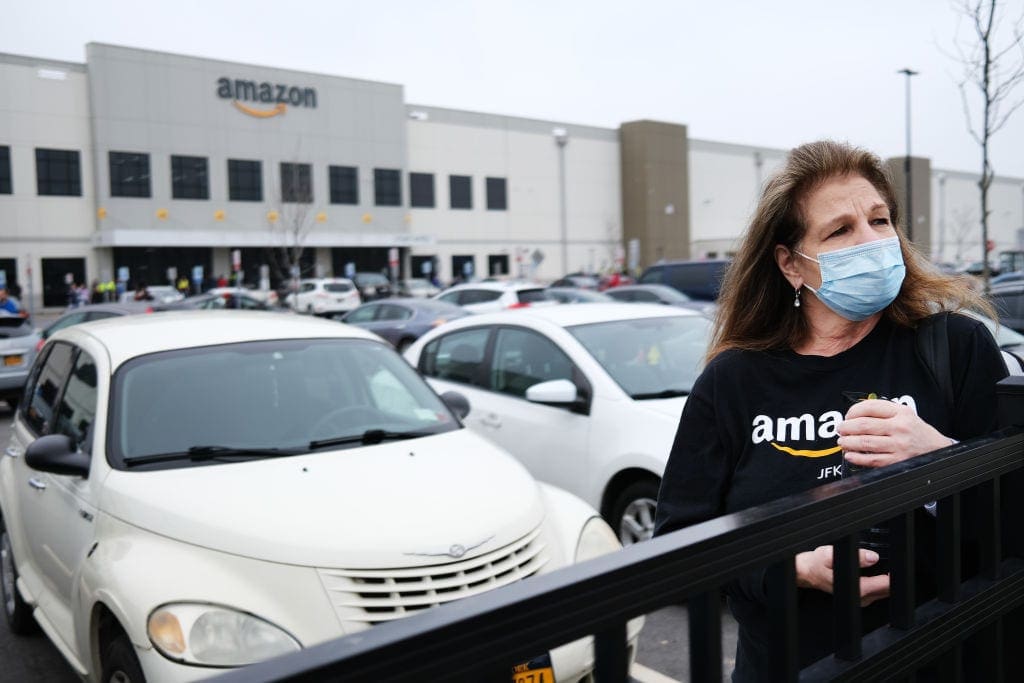“Amnesty International is alarmed by the growing evidence in recent months that Amazon is interfering with workers’ rights to organize, and investing significant resources in monitoring workers and the perceived ‘threat’ of potential trade union activity,” said Michael Kleinman, the Director of Amnesty International’s Silicon Valley Initiative. “Amazon’s own annual reports have identified the existence of labour unions as a risk factor in their international operations.”
On October 6, Recode reported that a leaked internal memo obtained included plans by Amazon to invest hundreds of thousands of dollars to monitor union ‘threats’ through a new technology system called “geoSPatial Operating Console”. While Amazon did not comment on whether the memo was genuine, its spokesperson told Recode that the company respects “employees’ right to join, form or not to join a labor union or other lawful organization of their own selection, without fear of retaliation, intimidation or harassment.”
In September, Amazon put out job advertisements for intelligence analysts responsible for tracking risks including “labor organizing threats against the company”. Amazon has since removed the job advertisements and stated that their posting was an error.
Also in September, internal Amazon documents obtained by Vice News show that the company has been secretly monitoring and analyzing workers’ private Facebook groups, including for the purpose of tracking plans for strike action or protests.
While Amazon claims that they respect workers’ right to join and form trade unions, it has not publicly disavowed the claims about surveillance and tracking of worker organizing and labour union activity. In a letter on September 21, 2020, Amnesty International asked Amazon for further information on this issue. On October 5, Amnesty International sent further correspondence to Amazon but has not received a reply yet.
Amazon’s efforts to discourage workers from organizing are not new, and the company’s own annual reports have identified the existence of works councils or labour unions as a risk factor in their international operations. For example, in the UK, Amazon has repeatedly in the past years issued legal notices for alleged trespassing and threats of injunctions to GMB union organizers who have attempted to approach and talk to workers outside of Amazon facilities. Furthermore, GMB organizers told Amnesty International that staff from Amazon human resources have confiscated and ripped up their pro-union leaflets handed out to workers once the worker was onsite.
In the U.S., warehouse workers who spoke out for their rights and raised concerns about working conditions during COVID-19, appear to have faced disciplinary action or have been subsequently fired.
International human rights law is clear that everyone has the right to form and join the trade union of their choice, and that trade unions play a fundamental role in ensuring respect for the right to work, including the right to just and favorable conditions of work. Under International Labour Organization (ILO) standards, union membership or participation in union activities must not be a cause of a dismissal or otherwise prejudice against a worker.
Amazon also has a responsibility to respect human rights, as articulated in the UN Guiding Principles on Business and Human Rights (UNGPs). The UNGPs make clear that the responsibility to respect human rights “…is a global standard of expected conduct for all business enterprises wherever they operate… and it exists over and above compliance with national laws and regulations protecting human rights.” This includes the responsibility to respect the rights to freedom of association, assembly and expression.
The importance of respecting the role of unions at workplaces became even more apparent during the COVID-19 pandemic. There have been numerous examples demonstrating how unions and workers organizations were critical in protecting the human rights of Amazon’s workforce and obtaining better health and safety measures and other protections from the company. These experiences show the close link between the right to organize, collective bargaining and the health and safety of workers.
For example, in France, unions helped to secure “health guarantees, a voluntary return to work for workers, adjusted schedules to help with distancing, and increased pay of EUR 2 per hour through the end of May.” In Italy, unions helped to secure in an agreement “constant cleaning processes and programmed and traced sanitizations; scheduling of work activities and organization of workstations with the guarantee that there is always at least two meters of distance between workers”.
Despite Amazon’s public expressions of appreciation and gratitude to the company’s workers, these sentiments do not seem to extend to the right to unionize. Amnesty International has communicated these concerns to Amazon in letters in April and September 2020. In its response to Amnesty International letter in April 2020 it stated “(o)ur approach on human rights is informed by international standards; we respect and support the Core Conventions of the International Labour Organization (ILO), the ILO Declaration on Fundamental Principles and Rights at Work, and the UN Universal Declaration of Human Rights”.
Amnesty International calls on Amazon to genuinely respect the rights of workers to join and form trade unions and to protect the rights of workers who speak out on human rights issues within their workplace.
Read more:
Jeff Bezos must address concerns of Amazon workers during COVID-19 crisis (news, April 24, 2020)
Media contact: Mariya Parodi, [email protected]

